 Muhammad Ali once said, “Champions aren’t made in the gyms. Champions are made from something they have deep inside them—a desire, a dream, a vision.” I might be bold enough to add good nutrition to that list.
Muhammad Ali once said, “Champions aren’t made in the gyms. Champions are made from something they have deep inside them—a desire, a dream, a vision.” I might be bold enough to add good nutrition to that list.
But, sadly, it seems the spirit of athletics and competition has become overshadowed by skepticism, doubt and accusation. Heroes from yesterday have become tomorrow’s targets. Family pastimes have turned into tabloid fiascos and team tryouts have become full-scale medical inquiries.
We must come together and cheer on the champions of our industry: nutrition, preventative care and yes, the supplementation that allows our bodies to achieve seemingly unattainable athletic goals.
“Athletes—from weekend warriors, to collegiate level and professionals—continue to search for supplements that can optimize performance, delay fatigue and improve recovery without containing steroids or steroid precursors,” says Kevin Owen, Ph.D., NAFTA head of technical marketing and scientific affairs at Allendale, NJ-based Lonza, Inc.
So let’s take the conspiracy out of sports nutrition and put the healthy competition back in. Retailers have the opportunity to show ‘em what we’re really made of.
Working it Out
“But they’re not regulated…supplements are steroids…who knows what’s in there…” Concern and confusion about the safety and quality of sports supplements continue to run rampant, faster than an Olympic sprinter. So let’s address it now, before the starting gun even goes off. Unfortunately, the few companies guilty of product violations seem to have inculpated the rest of the supplement industry. Gene Bruno, MS, MHS, consultant for Jarrow Formulas, Los Angeles, CA, and dean of academics at Huntington College of Health Sciences, says, “Once the public understands the extent of the new [cGMP] regulations, it will go a long way in helping to establish/re-establish a sense of safety regarding the use of sports supplements.”
But, it also seems that some irresponsible athletes scapegoat the industry. It is as much the responsibility of the athlete to be accountable for what they put in their bodies as it is for supplement manufacturers to be accountable for every ingredient going into a product. As with any industry, there will always be scam artists, but it is up to industry and athletes to make sure the good guys stay on the same team.
Bruno notes a major challenge is “sifting through the plethora of marketing claims about sports nutrition dietary supplements, and trying to determine which are based upon real science, and which are just ‘marketing science’ (aka bogus). Then, assuming the product actually works, trying to achieve a balance between safety and efficacy.”
|
Hormone modification is undoubtedly a very controversial subject, but it needs to be clarified that not all hormone modification supplements are steroids. The controversy will undoubtedly rage on as to whether tampering with hormone levels even with natural substances should be an acceptable course of action at all and exactly where on the spectrum supplementation becomes inappropriate.Here are some examples of hormone modifiers: • ZMA (Zinc magnesium aspartate) is a trademarked combination of zinc, magnesium, and vitamin B6 (pyridoxine). In addition to the processes aided by magnesium incuding the Kreb’s cycle and glycolysis, “Zinc is involved in the action of several hormones including insulin, growth hormone, testosterone and estrogen, and it is involved in more than 200 enzymatic reactions. Boosting the hormone testosterone can have many benefits including increased strength, lean muscle mass and energy levels” (1). • DHEA (deydroepiandrosterone) is a natural hormone produced by the adrenal glands and is the precursor to testosterone, progesterone and estrogen production. It has been suggested that it may help boost testosterone levels. • Growth hormone (GH) is released by the pituitary gland and has been shown to increase lean body mass, reduce body fat and increase energy (1). • Guggul, also known as guggulsterones or guggulipids, is a part of Ayurvedic medicine as well. It regulates the thyroid, maintains metabolic stability and lowers “bad” cholesterol to act as a fat reducer (buyers). It has been noted to be helpful for losing that last bit of fat that is often the most difficult to lose. Other hormone-modifying herbs are fenugreek, Tribulus terrestris. When dealing with professional or team athletes, retailers should advise them to determine what is allowed and what is discouraged for any supplement use. Reference
|
There are several ways to ensure that the sport supplements on your shelves are safe, including making sure they are Generally Recognized as Safe (GRAS), that they follow Good Manufacturing Practices (GMP/cGMP), they are certified by groups such as the World Anti-Doping Associations and they have undergone clinical studies. Says Bruce Abedon, Ph.D., director of scientific affairs for Nutragenesis, LLC, Brattleboro, VT, “The best way to determine proper dosing is through randomized, double-blind, placebo-controlled trials that are the ‘Gold Standard’ for human health studies.”
 The NSF International GMP certification program, according to Steve Holtby, president and CEO of Soft Gel Technologies, Inc., Los Angeles, CA, has a separate GMP “Certified for Sport” process that includes regular auditing at a company’s manufacturing facility. Examinations include warehousing, facility maintenance, quality processes and analytical testing. Also, it ensures that prohibited substances such as stimulants, narcotics and anabolic modifiers are not manufactured or handled by the facility.
The NSF International GMP certification program, according to Steve Holtby, president and CEO of Soft Gel Technologies, Inc., Los Angeles, CA, has a separate GMP “Certified for Sport” process that includes regular auditing at a company’s manufacturing facility. Examinations include warehousing, facility maintenance, quality processes and analytical testing. Also, it ensures that prohibited substances such as stimulants, narcotics and anabolic modifiers are not manufactured or handled by the facility.
“Retailers should work hard at educating themselves and their sales staff about the safe and effective use of dietary supplements, including potential adverse side effects and common drug interactions. While this might seem like an overwhelming task, there are a number of good books on this subject,” says Bruno.
Have a Nutrition Game Plan
Even without the pressures of the media, athletes face their own personal challenges as part being an athlete. Actual competition is obviously tough, but the consistent upkeep of one’s body can be a more daunting task. “Amateur and/or professional athletes are constantly juggling career, family, training, and time for each,” says John Urban, C.P.T., sports general manager at NOW Foods, Bloomingdale, IL. “Though maintaining motivation and constant high-levels of performance can be a battle, the main challenge of any athlete would have to be preserving health. Stress on the body, mind and spirit can wreak havoc and take its toll on any level performer.”
Gabe Herrick, sales manager at Bioenergy Life Science, Inc., Minneapolis, MN, agrees: “Pre-season training, mid-
season maintenance and injury prevention are all challenges athletes must overcome. Having your body prepared inside and out is crucial.”
Keeping the body fit and focused during off-season is challenging, but perhaps even more so for athletes whose sports are practiced year-round. Either way, an athlete’s basic dietary regimen before supplementation should address his/her specific needs. For example, many athletes on a high-carbohydrate diet do well for themselves by eating breads and pastas, but might be short-changing their bodies by not eating the whole grains versions of them.
Also, Jason Mitchell, N.D., vice president of new product development, research and education for Country Life Vitamins, BioChem and Iron-Tek, recommends essential fatty acids found in fish oil, flax seed oil and borage oil for muscle repair and general health in addition to vitamins and minerals.
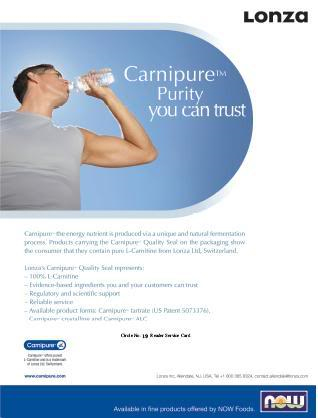 Prior to a big event or competition, food can be even more important. “One line of thinking is that the same basic, healthy dietary practices should be followed all the time, including prior to a big event. Another line of thinking is to go heavy on the complex carbohydrates in order to help build up glycogen levels to support endurance,” says Bruno. However, depending on the athlete’s needs, this can vary.
Prior to a big event or competition, food can be even more important. “One line of thinking is that the same basic, healthy dietary practices should be followed all the time, including prior to a big event. Another line of thinking is to go heavy on the complex carbohydrates in order to help build up glycogen levels to support endurance,” says Bruno. However, depending on the athlete’s needs, this can vary.
“The age-old recommendation of pasta and pancakes before an event remains as valid as ever, “says James Gibbons, president of Nature’s Plus, Melville, NY. “But, newer research indicates that protein must be added to the carbohydrates for even better performance. In fact, the American Dietetic Association, Dieticians of Canada and the American College of Sports Medicine have all adopted positions endorsing the intake of proteins and carbohydrates together, near the time of the event, for optimal performance and recovery.”
Protein and Amino Acids
It makes sense that protein would be such a crucial part of an athlete’s regular diet, being that proteins and amino acids are the building blocks for most of the body’s parts and functions. It is important to understand the basics of proteins and amino acids for this very reason.
 Proteins. Proteins are molecules each comprised of their own combination of 20 amino acids, giving the amino acid its unique functioning capability. Two types of proteins are globular and structural. Structural proteins are those that make up our hair and the long, thin filaments in our muscles. Another example of a structural protein is collagen, which helps give strength to tissues and bones that receive continual wear and tear. “Athletes that work out two or more hours a day rely on the body’s ability to manufacture collagen, which keeps their joints healthy and strong and prevent injury” (1).
Proteins. Proteins are molecules each comprised of their own combination of 20 amino acids, giving the amino acid its unique functioning capability. Two types of proteins are globular and structural. Structural proteins are those that make up our hair and the long, thin filaments in our muscles. Another example of a structural protein is collagen, which helps give strength to tissues and bones that receive continual wear and tear. “Athletes that work out two or more hours a day rely on the body’s ability to manufacture collagen, which keeps their joints healthy and strong and prevent injury” (1).
Some of the most important examples of globular proteins are enzymes, catalysts that make so many of the chain reactions in our bodies occur. They help us absorb, process and digest our food and the amount of enzymes (of which there are many types) determines how quickly a chemical event will occur. Therefore, enzymes are crucial for everyone’s health, but especially for athletes, whose biochemical processes are regularly stressed beyond the norm.
<licata enterprises ad - left>
Proteins are also important for fluid balance: the amount of protein in a cell will determine how much water is attracted to the cell. Thus, protein is important for proper hydration and to enhance muscle and nerve cell function.
Amino Acids. Following is a brief listing of amino acids and their relationships to the body:
Nonessential amino acids (meaning the body has the ability to make them): alanine, asparagine, aspartate, cysteine, glutamate, glutamine, glycine, proline, serine and tyrosine. Cysteine in its N-acetylcysteine form has been noted for clearing out heavy metals, which can lead to an overall healthier state to make training more effective.
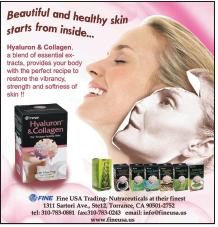 Essential amino acids (those that the body can’t synthesize on its own): isoleucine, leucine, lysine, methionine, phenylalanine, threonine, tryptophan and valin. Leucine, isoleucine and valine are also known as branched-chain amino acids (BCAAs). They are responsible for maintaining muscle tissue by preventing muscle breakdown during exercise. Uniquely, they are not metabolized in the liver, but rather in peripheral tissue and are more readily available for the body. When used in moderation, BCAAs may allow athletes to recover more quickly after a workout (1).
Essential amino acids (those that the body can’t synthesize on its own): isoleucine, leucine, lysine, methionine, phenylalanine, threonine, tryptophan and valin. Leucine, isoleucine and valine are also known as branched-chain amino acids (BCAAs). They are responsible for maintaining muscle tissue by preventing muscle breakdown during exercise. Uniquely, they are not metabolized in the liver, but rather in peripheral tissue and are more readily available for the body. When used in moderation, BCAAs may allow athletes to recover more quickly after a workout (1).
Semi-essential amino acids (these can be made in the body to a certain extent, but they become essential for some people when the body’s demand increases): arginine and histidine.
Creatine, ornithine and taurine are not found in body proteins, but are important for metabolic function.
Protein supplementation. Beyond food sources of protein such as chicken and fish, protein can be found in supplements such as whey, soy or rice powder, or as individual amino acids. Whey is an example of a complete protein (containing all 20 amino acids), but soy and rice can be made complete with the addition of specific individual amino acids if a customer prefers not to use animal products. Retailers should have these forms available and be able to explain to customers the differences.
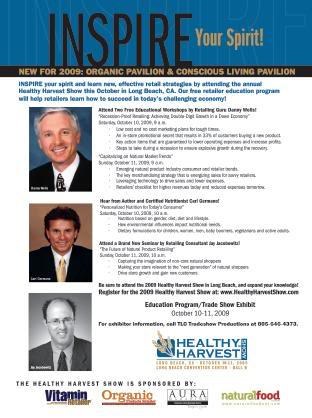 Whey is a protein complex that comes from cow’s milk and is often said to be more readily absorbed as compared to the separate amino acids. Typically, four types of whey should be available: whey protein isolate (little to no fat, lactose or mineral content but high in pure protein), whey protein concentrate (usually around 80% protein with some fat, lactose and minerals), hydrolyzed whey protein (often the least allergenic due to its processing) and undenatured whey protein concentrate (the least processed form of whey supplements) (1). Retailers should also ask customers if they have any allergies or sensitivities to dairy, although lactose is usually removed in whey supplements and can often be tolerated by those who can’t drink milk.
Whey is a protein complex that comes from cow’s milk and is often said to be more readily absorbed as compared to the separate amino acids. Typically, four types of whey should be available: whey protein isolate (little to no fat, lactose or mineral content but high in pure protein), whey protein concentrate (usually around 80% protein with some fat, lactose and minerals), hydrolyzed whey protein (often the least allergenic due to its processing) and undenatured whey protein concentrate (the least processed form of whey supplements) (1). Retailers should also ask customers if they have any allergies or sensitivities to dairy, although lactose is usually removed in whey supplements and can often be tolerated by those who can’t drink milk.
Soy is an excellent vegetarian choice for protein supplementation. However, finding an organic soy supplement can be more difficult, and a large percentage of soy crops have been genetically modified (on purpose or from cross contamination). Also, male customers may have concerns about the phytoestrogens contained within soy. Many soy protein isolates are processed to remove the phytoestrogens.
Rice protein is an excellent vegan, hypoallergenic option. Rice protein typically has a higher carbohydrate count compared to soy or whey, so athletes might consider this supplement for increased energy or weight gain. Some rice proteins are also made from genetically altered crops, for which the health effects are not known. Stock your stores with products that have clear labeling. Rice proteins usually don’t have a high mineral content either, compared to other kinds.
Healthy adults require approximnately 45–65 grams of protein per day, or 0.36 grams per pound of body weight (protein book). Athletes, because of the increased demands on their body, usually require more protein. It is needed to maintain body function and repair tissues from hard training. To make shopping easier for customers—and retailers—a chart containing fundamental protein and amino acid information should be placed in your sports supplement section so no one has to search numerous product labels for information.
Going the Distance
Every athlete knows: no pain, no gain. However, there’s productive pain and there’s damaging pain. Depending on an athlete’s sport, their supplement regimen needs to be tailored to ensure that the body functions optimally without injury. For example, “If your sport requires fast-twitch muscle groups, you should be eating and supplementing in larger amounts of protein. If your sport is more endurance oriented with repetitive activity, high carbohydrates are needed. For both kinds of sports, athletes should try to get as many vitamins and minerals as possible, “ says Herrick.
Although many of the following supplements are useful for several aspects of athletic training and some of them work effectively in combination, they can be broken into general categories of use so retailers can better help their athletic customers.
Joint care. Our bones and joints become stressed over time simply from walking and doing our day-to-day activities. This becomes magnified with exercise, but add some high-intensity sparring or marathon training to that and you’ve got a recipe for major bone and joint damage. Collagen, hyaluronic acid, glucosamine and chondroitin are a few options for bone and joint support. Gymnasts and martial artists are particularly susceptible to bone and joint damage due to their need to blend and flex often in somewhat unnatural ways.
According to Holtby, exercise can also cause increased production of free radicals, and intense or prolonged exercise can cause radical-mediated injury to skeletal muscles. These radicals may also contribute to muscular fatigue during endurance events. Therefore, antioxidants may be effective. “Numerous animal studies indicate that antioxidant supplements can delay muscular fatigue,” says Holtby.
One carotenoid, astaxanthin, can also help. It can reduce pain triggered by inflammation (2). Astaxanthin is unique in that it can also cross the blood-brain barrier to bring antioxidant and anti-inflammatory protection to the brain and central nervous system. It can also cross the blood-retinal barrier to bring antioxidant and anti-inflammatory protection to the eyes, helping athletes maintain their “eye of the tiger.”
Revving the athletic engine. Sometimes, half the battle is starting the engine and going from zero to superathlete—especially when it comes to early morning training. Conditions such as hot weather, overtraining or repetitive competition/games can drain even the most conditioned athlete’s energy and endurance.
|
AquaGenus: Offers AquaHydrate, an alkaline pH, mineral-rich, ionically activated water designed for the hydration, performance and recovery needs of athletes. Bioenergy Life Science: Supplies Bioenergy Ribose, a substance that can increase endurance and athletic performance, as well as speed recovery. Country Life Vitamins: Offers Ultra Concentrated Omega 3-6-9. Iron-Tek: Offers Essential Natural Whey, Essential Creatine, Essential L-Glutamine Powder. Jarrow Formulas: Offers CoQ10, Whey Protein, GPLC GlycoCarn Creatine Surge Creatine monohydrate mixed with anticatabolic nutrients such as glutamine, ribose and taurine delivered in a base of 35 grams of pure dextrose. MityQondria supports ATP production. Lonza: Carnipure is a premium grade of L-Carnitine. Mineral Resources International: elete Electrolyte Add-In can make any beverage a sports drink without any added calories, artificial colors, flavors or preservatives. Also, Tablytes provide nine electrolytes to support hydration, fluid balance, energy conversion and utilization in a bioavailable form. Nature’s Plus: Advanced Therapeutics Ultra Rx Joint is rich in glucosamine, chondroitin and MSM for joint support. The SPIRU-TEIN line of shakes offers 25 flavors and a variety of protein sources. NOW Foods: Offers a full line of sports supplements including creatine, amino acids, natural weight loss products, whey protein isolates and concentrates, and more. Nutra Bridge: 7-Keto is a non-stimulant, thermogenic fat burner. Nutragenesis: Sensoril offers ashwagandha and has cortisol-lowering properties. WellTrim is a stimulant-free weight-loss ingredient. The company is developing TrimElite, a proprietary blend of Sensoril and WellTrim. Nutratech, Inc.: Advantra Z, derived from bitter orange, is an all-natural thermogenic ingredient. Soft Gel Technologies, Inc.: Carnisol is a soft gelatin formula made with Carnipure from Lonza. T-Phenol 30, T-Phenol 60, T-Phenol 60D and T-Phenol 100D are four green tea products to offer antioxidant protection, heart, weight-loss and immune support. |
“Supplements that support ATP production (the ‘energy currency’ of the body) via the Kreb’s cycle and oxidative phosphorylation have great potentional to improve energy/endurance. Such products might include one or more of the following nutraceuticals: CoQ10, alpha-lipoic acid, acetyl-L-carnitine,” says Bruno.
Caffeine also is a tried-and-true energy booster for various levels of athletes. “Caffeine’s positive effect on athletic performance is most significant for endurance events such as long-distance running, cycling and swimming. Normally, after 30 minutes of exertion, glycogen begins to deplete. Caffeine can slow the depletion of glycogen,” says Holtby. He also warns that performance-enhancing doses of caffeine can cause one to urinate with greater frequency and with higher volumes. Therefore, the diuretic action of caffeine needs to be balanced by drinking plenty of non-caffeinated beverages before, during and after exercise. Also, some athletes can get restless and nervous with caffeine and even small amounts can cause insomnia, which can be disastrous for any training regimen.
As a source of caffeine, green tea also has many other benefits. Catechins, called epigallocatechin gallate (EGCG), offer antioxidant protection, support heart and immune system health, provide energy and vitality, and aid weight loss, says Holtby.
Guarana has also been noted for its caffeine-like effects.
Once the initial startup is achieved, being able to push for those few extra moments or miles is a common issue that many athletes can address with supplementation. Carnitine is an example of a supplement that can help the body to function more efficiently, allowing it to continue working when it otherwise might have quit. While carnitine is the actual nutrient, L-carnitine is the bioavailable form found in supplements. L-carnitine is composed of two amino acids: lysine and methionine. It transports fatty acids into the mitochondria, the cell responsible for making energy in our bodies. In a nutshell, L-carnitine, particularly in the GPLC or ester carnitine form, enables your body to use more fatty acids during an intense workout, resulting in more efficient energy production and waste removal (3). This can be extremely vital, as even a few minutes of extra endurance can be the difference between glory and gloom.
In addition, says Owen, “Proper heart function relies on high efficiency of energy conversion, in which L-carnitine is directly involved.” Also, he says, “Other clinical research indicates L-carnitine supplementation helps maintain healthy cholesterol and triglyceride levels,” something every athlete can appreciate, marathoner or not.
If you happen to be a marathoner, however, there is one supplement that has been used for centuries as a slow-burning fuel for endurance—chia. Chia seeds are extremely high in fiber, resulting in a slower breakdown and absorption of carbohydrates. Therefore, the energizing effect lasts longer. In addition, chia seeds contain protein for muscle building and repair, a high amount of essential fatty acids for joint flexibility and overall wellbeing, antioxidants, and a full spectrum of essential vitamins and minerals.
On the herbal front, says Bruno, “Adaptogenic herbs such as rhodiola and ashwagandha can also help improve endurance and increase work capacity.”
Abedon agrees about ashwagandha. In a randomized, double-blind, placebo-controlled clinical trial referenced by Abedon, ashwagandha (as Sensoril from Nutragenesis) proved to energize the body in a stimulant-free manner, lower cortisol levels and reduce symptoms of overtraining (including fatigue, irritability, anxiety, insomnia and loss of appetite).
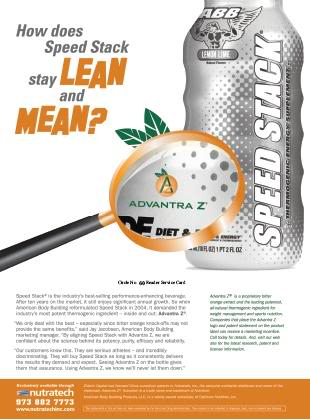 Usually associated with traditional Chinese medicine, velvet antler is another option that is said to have anti-
Usually associated with traditional Chinese medicine, velvet antler is another option that is said to have anti-
inflammatory properties and help promote athletic activity.
Sweating the small stuff. Hydration during strenuous activity is an extremely important challenge that is often overshadowed by nutrition and supplementation. But, proper hydration can make or break athletic performance. “Excess loss of water through sweating, breathing and urinating is often underestimated by athletes,” says Cheryle R. Hart, M.D., author and consultant for AquaGenus, Huntington Beach, CA. “Inadequate fluid intake thickens blood, making the heart pump harder and faster. Muscles receive less oxygen and fatigue prematurely.
Dehydration steals mental focus and concentration. When severe, dehydration increases the risk of life-threatening heat injury such as heat stroke,” she continues, recommending that an individual should drink 2–3 milliliters (about 17–20 ounces) of water for every pound of body weight at least for hours before exercise or competition. An additional 8–10 ounces should be consumed 15 minutes prior to beginning.
Athletes should strive to hydrate themselves before, during and after exercise, but commonly don’t because of the feeling of fullness or “sloshing” discomfort. Hart recommends water with ionic minerals so the water is more readily absorbed at the cellular level.
This brings us to another important issue: electrolyte balance. “Individuals who sweat a lot and/or are competing in intense or prolonged activities under high heat conditions should replace important electrolytes, especially sodium,” says Hart.
Val John Anderson, executive vice president, director of sales and marketing for Mineral Resources International, Inc., Orem, UT, agrees: “Many athletes are overly focused on a few nutrients—carbs, calories, fats and protein—at the expense of a broader range of essential nutrients. Magnesium, for instance, is an essential electrolyte that is required for energy conversion within the body. As such, no other electrolyte, mineral, vitamin, nutrient—not even carbs—can replace it.” He notes that ATP is dependant on magnesium and often exists as a compound with it, stated as MgATP. “So,” says Anderson, “magnesium is an electrolyte that athletes really cannot afford to skimp on.”
Electrolytes can be found in various waters, sports drinks, gels and salt supplements. Additionally, sports drinks and waters should preferably not have any artificial sweeteners, preservatives, additives or colorings. One additive for example, brominated vegetable oil in citrus-flavored drinks, has been banned in many countries because of its association with muscle weakness and mental confusion, says Hart.
Recovery. For athletes competing in events such as weight lifting, muscle recovery is extremely important. Ribose is a supplement with great potential. “Ribose is a five-carbon sugar that is the limiting factor when your body produces ATP. If taken before exercise, ribose increases endurance and athletic performance. If taken after exercise, ribose reduces stiffness, cramping and soreness, which helps athletes recover faster. Ribose has also been shown to aid in cardiovascular health, a rising issue in the sports nutrition industry,” says Herrick. For more on ribose, refer to last month’s Vitamin Connection.
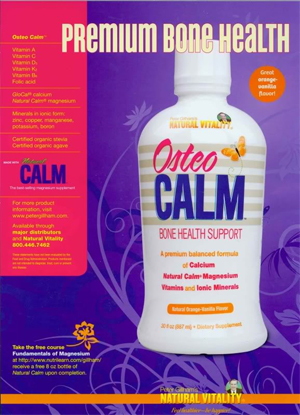 Also, glutamine, the most abundant amino acid in the body found in bones, muscles and blood, is involved in more metabolic processes than any other amino acid. It is considered to be conditionally essential, meaning that it is essential to supplement during times of physiological stress. Athletes who overtrain may be depleted in glutamine, making them more susceptible to infection.
Also, glutamine, the most abundant amino acid in the body found in bones, muscles and blood, is involved in more metabolic processes than any other amino acid. It is considered to be conditionally essential, meaning that it is essential to supplement during times of physiological stress. Athletes who overtrain may be depleted in glutamine, making them more susceptible to infection.
Colostrum has also been known to aid in recovery and overall wellness.
Pumping Up and Paring Down
Each athlete has unique needs. Quite often those needs are related to body weight and muscle mass. Sometimes, athletes need to pump up and some need to pare down. As previously mentioned, protein supplementation in its various forms can strongly influence an athlete’s weight, whether to gain or reduce.
More power to you. Weight-lifters, boxers and football players can benefit from increased weight, muscle mass and power. However, this seems to be a sticky area that causes much concern about inappropriate performance-enhancing product use such as creatine. Let’s clear this up. In the June Vitamin Connection in WholeFoods, Richard Passwater, Ph.D., writes, “Creatine is no more of an independent performance enhancer than proteins, vitamins or minerals. Creatine, along with intense exercise and a good diet, will help build strength. On the other hand, anabolic steroid drugs hand-build muscle without exercise and they have deadly side effects. Creatine is a nutrient and it is also made in the body.”
 Mitchell says, “Creatine is a very valuable tool for increasing explosive energy during exercise. There are a lot of different forms of designer creatines on the market and, truth be told, the form that will always work is creatine monohydrate.”
Mitchell says, “Creatine is a very valuable tool for increasing explosive energy during exercise. There are a lot of different forms of designer creatines on the market and, truth be told, the form that will always work is creatine monohydrate.”
Additionally, says Urban, “Supplements that include whey protein are beneficial because they may increase endurance and prevent fatigue, allowing muscle growth. The amino acids found in whey protein may boost mood and memory, lower blood pressure and improve circulation.”
Pare down. Vitamins and minerals, although important for everyone, can be especially important for athletes who must lower their weight to meet weight-class requirements for sports such as wrestling, boxing and martial arts. Holtby says, “Vitamin and mineral supplements may be required for athletes who restrict energy intake, have severe weight-loss practices, eliminate one or more food groups from their diet, or consume high-carbohydrate diets with low micronutrient density. Increased demand is made on some of the B vitamins during exercise including thiamin, niacin, riboflavin, pyroxidine and pantothenic acid.”
Holtby says a complete weight-control program involves three components:
- A balanced nutritional plan with reduced-calorie intake.
- An aerobic exercise program to increase the burning of calories.
- Behavior modification to make sure you implement the first two items.
Weight control can also be addressed though the use of thermogenics. Bob Green, president of Nutratech, Inc., West Caldwell, NJ, says, “Thermogenesis is the only scientifically proven method for fitness and weight management. Thermogenesis (the production of heat in the body) increases the resting metabolic rate and the rate at which fat is released from body stores and broken down (lipolysis) to help build lean muscle and burn fat and calories.” Citrus aurantium, also called bitter orange, is one of these ingredients.
These thermogenic products, adds Scott Steil, president of Nutra Bridge, Shoreview, MN, increase the activity of key fat-burning enzymes.
Also, Garcinia cambogia is a small fruit containing an extract called hydroxycitric acid (HCA), claimed to suppress appetite and enhance fat burning.
Retailers should remind athletes not to rely on any one product for health and weight loss. Athletes should be encouraged to properly balance their training with proper diet, supplementation, rest and emotional health. True athletic performance can only be achieved through healthy mind, body and spirit. WF
References
- K. Marshall, User’s Guide to Protein and Amino Acids (Basic Health Publications, Laguna Beach, CA, 2007).
- B. Capelli, Natural Astaxanthin: King of the Carotenoids (Cyanotech Corporation, Kailua-Kona, HI, 2007).
- V. Tweed, User’s Guide to Carnitine and Acetyl-L-Carnitine (Basic Health Publications, Laguna Beach, CA, 2006).
Published in WholeFoods Magazine, Sept. 2009


 Ok, Let’s Talk About It
Ok, Let’s Talk About It Select Sports Supplement Offerings
Select Sports Supplement Offerings






